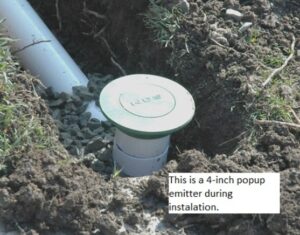When purchasing a home, there are many factors to consider, from the location and condition of the property to its price and features. However, one factor that is often overlooked but can significantly impact both your health and your home’s value is radon. This invisible, odorless gas is a major concern for homeowners and homebuyers alike, as it can pose serious health risks. In this guide, we’ll explore what every homebuyer needs to know about radon, its connection to real estate, and how home inspectors and radon experts play a key role in safeguarding your new home. radon real estate Fort Collins CO
What Is Radon and Why Should You Be Concerned?
Radon is a naturally occurring radioactive gas that is produced by the decay of uranium in soil, rock, and water. It can enter homes through cracks in the foundation, gaps around pipes, and even crawl spaces. Unfortunately, radon is not something you can see or smell, which makes it all the more dangerous. The U.S. Environmental Protection Agency (EPA) estimates that radon is responsible for approximately 21,000 lung cancer deaths every year, making it the second-leading cause of lung cancer after smoking.
As a potential homebuyer, you might be wondering how radon could affect your investment. Radon can infiltrate any home, whether it’s old or new, and it’s important to ensure that your future home is free from this hazardous gas. This is where the role of home inspectors and radon experts becomes crucial.
How Radon Affects Real Estate
Radon is not only a health hazard, but it can also affect your home’s resale value. Homes with high radon levels might struggle to sell, as many buyers are concerned about the health risks associated with prolonged exposure. Moreover, the presence of radon could indicate issues with the home’s foundation or ventilation, which could raise red flags for buyers.
For homebuyers, knowing the radon levels of a property is critical. Some sellers may have already taken steps to mitigate the problem, but it’s essential to confirm whether the home has been properly tested for radon and whether any radon mitigation systems have been installed.
The Role of Home Inspectors in Radon Detection
When purchasing a home, home inspectors are your first line of defense in identifying potential issues with the property, including radon. A home inspection will typically include a visual assessment of the home’s structural integrity, plumbing, electrical systems, and appliances. While most home inspectors are not licensed to perform radon testing, they can advise you on whether further testing is needed and recommend radon experts for an in-depth assessment.
During a standard home inspection, home inspectors might identify signs that suggest radon could be present, such as cracks in the foundation or inadequate ventilation in the basement or crawl space. If they suspect radon could be an issue, they will typically recommend you hire a certified radon expert to conduct a radon test.
What Does a Radon Test Involve?
A radon test involves using specialized equipment to measure the concentration of radon gas in a home. There are two main types of radon tests:
• Short-Term Testing: This test typically lasts between 2 and 7 days. It provides an immediate reading of the radon levels in the home.
• Long-Term Testing: This test can last anywhere from 90 days to a year. It provides a more accurate average reading of the radon levels over time.
The EPA recommends that homes have a radon level of 4 picocuries per liter (pCi/L) or lower. If the test results show higher levels, radon mitigation measures will need to be taken.
Radon Mitigation: What Does It Involve?
If your new home tests positive for radon, don’t panic. There are effective solutions available. Radon mitigation is the process of reducing radon levels in the home to a safe level, typically below 4 pCi/L.
Common radon mitigation methods include:
• Sub-Slab Depressurization: This involves installing a pipe beneath the foundation of the home to draw radon out of the soil and vent it safely above the roofline.
• Crawl Space Vapor Barrier: In homes with a crawl space, installing a crawl space vapor barrier can prevent radon from entering the home. This plastic sheeting acts as a seal, preventing radon and moisture from seeping into the house.
• Increased Ventilation: This method increases airflow in the home, allowing radon to disperse and reducing its concentration inside the house.
Once radon mitigation measures are implemented, it’s essential to test the home again to ensure the radon levels have been successfully reduced. This is why it’s important to work with both radon experts and home inspectors to ensure that any mitigation efforts are properly executed.
The Importance of a Crawl Space Vapor Barrier in Radon Mitigation
Many homes with crawl spaces are at a higher risk of radon infiltration. A crawl space vapor barrier is an effective way to prevent radon and moisture from entering the home. By sealing the floor of the crawl space with a thick plastic sheet, the barrier blocks radon from entering the home through the soil. This can be an essential component of your home’s radon mitigation strategy, especially if your home’s crawl space is prone to dampness or moisture issues.
How to Make Sure Radon Is Handled Properly in Your Potential Home
As a homebuyer, it’s essential to take proactive steps to ensure that radon is not an issue in your new home. Here’s a checklist to guide you:
• Hire Qualified Home Inspectors: Ensure that the home you are considering is inspected by certified home inspectors who can provide a thorough review of potential radon risks.
• Request Radon Testing: Even if the home appears to be free from radon-related issues, ask for a radon test to be conducted.
• Consult Radon Experts: If the home tests positive for radon, contact radon experts for an evaluation and mitigation options.
• Consider Installing a Crawl Space Vapor Barrier: If the home has a crawl space, ask about installing a crawl space vapor barrier as part of the mitigation plan.
Conclusion
Understanding the risks of radon and its potential impact on your real estate investment is essential for any homebuyer. By working closely with home inspectors Greeley CO and radon experts, you can ensure that your new home is safe, healthy, and free from radon-related hazards. Don’t overlook this critical aspect of homeownership—take the necessary steps to protect both your family’s health and your investment.
Radon testing and mitigation may require an upfront investment, but the long-term benefits of a safe, healthy home make it well worth the effort. Whether it’s installing a crawl space vapor barrier or ensuring proper ventilation, addressing radon concerns will provide peace of mind for years to come.




More Stories
Louis Vuitton Wall Art: The Ultimate Statement in Luxury Interior Decor
How to Choose the Right Wedding Photographer in Denver Without Stress
What to Know Before Hiring a Gutter Company in Gainesville FL: A Friendly Guide